This article was co-authored by Laura Marusinec, MD. Dr. Marusinec is a board certified Pediatrician at the Children's Hospital of Wisconsin, where she is on the Clinical Practice Council. She received her M.D. from the Medical College of Wisconsin School of Medicine in 1995 and completed her residency at the Medical College of Wisconsin in Pediatrics in 1998. She is a member of the American Medical Writers Association and the Society for Pediatric Urgent Care.
There are 28 references cited in this article, which can be found at the bottom of the page.
This article has been viewed 68,680 times.
The term "gastritis" describes a combination or "constellation" of symptoms. However your gastritis presents, it will be marked by inflammation, erosion, or ulcer in the stomach lining.[1] Though gastritis usually improves with treatment, ulcers can increase your risk of stomach cancers.[2] It's important to recognize the symptoms of gastritis so you can get early treatment, relieve your symptoms and prevent complications.
Steps
Recognizing the Symptoms of Gastritis
-
1Take note of abdominal pain. Patients with gastritis often experience "epigastric pain," or pain in the upper central abdomen.[3] It can be described as a burning, gnawing, or deep boring pain. You may find that it wakes you up in the middle of the night, but it can often be relieved by eating something or taking an antacid.
-
2Look for nausea and vomiting.[4] These symptoms are fairly common with gastritis. You may also see blood or bile in your vomit. The blood may be partially digested and look like coffee grounds.[5] This is caused by bleeding ulcers.[6] You should contact a doctor immediately if you see blood or green bile in your vomit.
- Excessive vomiting can often lead to dehydration, which can also be dangerous. Make sure to get a lot of fluids if you're vomiting.
Advertisement -
3Check for black, tarry stool.[7] The black, tarry stool seen in many gastritis patients is called “melena.” The same bleeding ulcers that make people vomit blood causes them to excrete it through stool. This should also be reported to the doctor as soon as possible.
-
4Be aware of a change in appetite.[8] People with gastritis often find that they've lost their appetite. You may lose it altogether or simply find that you feel full after a smaller amount of food than usual. Take notice if your clothes feel unusually loose without any explanation. If you're losing weight without purposely dieting, you may be eating less.
- If your appetite decreases significantly, you may eat little enough to be considered anorexic. See a doctor if you feel woozy or dizzy from a lack of nutrition or fluids.
-
5Notice excessive burping and bloating. The inflammation in the stomach lining causes gases to build up. This, in turn, can make you belch more than you usually would. Even with the release of gas through burping, you may still feel bloated from all the gas that’s trapped in your stomach.
Getting Diagnosed
-
1See a doctor for a physical exam. Let the doctor know that you suspect gastritis, and ask him to focus on an abdominal exam. Bring a prepared list of all the symptoms you’ve experienced and show it to your doctor. He will look for “alarm symptoms” that suggest you need urgent care. The alarm symptoms you should make sure to tell the doctor about are:[9]
- Vomiting blood or bile
- Black tarry stool (melena)
- Appetite loss, anorexia, and weight loss (especially of six pounds or more)
- Anemia (this may cause you to be pale, tired, weak, or dizzy)
- A bulge you can feel in your abdomen
- Let the doctor know if you are over 55 years old, as well.
-
2Allow the doctor to take a blood sample. Once the sample has been drawn, he will send it to the medical lab for analysis. The lab may run the following tests:
- Complete Blood Count (CBC) to check for anemia
- Amylase and Lipase to rule out pancreatic disease
- Liver function test and renal function test to assess for dehydration and for other causes of your symptoms if you’re vomiting
- Stool guaiac test for occult blood (not visible in the stool)[10]
- A urea breath test or stool/blood test to check for the bacteria Helicobacter Pylori[11]
-
3Be prepared for an endoscopy if you have "alarm symptoms." If the doctor is worried about the list of symptoms you've provided, he will likely order an endoscopy for you. He will insert a small camera attached to a long, flexible tube down your throat. The camera will reach far enough down to observe the esophagus, stomach, and part of the small intestine.[12] If you tested negative for H. Pylori, but continue to have symptoms, you may choose to have an elective endoscopy.
- You can ask for a sedative during the procedure to help you relax. While you may feel pressure, you won’t feel any pain.
- The doctor will look for ulcers, erosions, tumors, and other abnormalities. He can also take biopsies to be tested in the lab.
Eradicating the H. Pyloria Bacteria
-
1Take medication to fight the H. Pylori bacteria.[13] [14] If your gastritis is caused by this bacteria, your doctor will prescribe medication to kill it. The first “eradication protocol” for addressing this bacteria has a 90% success rate.[15] Your doctor may prescribe four medications to be taken for one day:
- Pepto Bismol: 525 mg taken orally four times
- Amoxicillin: 2 g taken four times
- Flagyl: 500 mg taken orally four times
- Lansoprasole: 60 mg taken orally once
-
2Proceed to the second “eradication protocol” if necessary. If the initial treatment does not successfully kill off the H. Pylori bacteria or if your doctor feels that you should do so, your doctor may prescribe a second round. The combination of medications in this protocol have an 85% success rate at killing the bacteria:[16]
- Biaxin: 500 mg taken orally twice daily for seven days
- Amoxicillin: 1 g taken orally twice daily for seven days
- Lansoprazole: 30 mg taken twice daily for seven days
-
3Expect longer treatment for children. Shorter, more intense treatments are not recommended for children. Not enough studies have been done to research the effects on their bodies. Instead, the doctor will recommend a longer two-week regimen. Their medication will also be prescribed in divided doses. For example, a divided dose of 50 mg/kg per day means you give the child 25 mg/kg twice during the course of the day.
- Amoxicillin: 50 mg/kg in divided doses twice daily for 14 days.[17]
- Biaxin: 15 mg/kg in divided doses twice daily for 14 days.
- Omeprazole: 1 mg/kg divided twice daily for 14 days.
Relieving the Symptoms
-
1Learn the goal of supportive treatment.[18] If you didn’t have the H. Pylori bacteria or after it’s been addressed, the remaining treatment for gastritis is “supportive.” This means that its goal is to relieve symptoms.
-
2Reduce your stress levels. Gastritis can be caused by severe stress related to major surgery, injury, burns or severe infections.[19] Lowering your stress may help with your gastritis.
-
3Treat any heartburn you experience. People have different experiences of heartburn. Some may feel a mild burning while others have pain so severe it feels like a heart attack. Heartburn is the result of stomach acid getting up into the esophagus where it doesn't belong. This is often the result of a loose gastroesophageal sphincter. If you overeat, you can apply too much pressure on this sphincter, forcing your stomach contents up past it.[20] Heartburn can also be caused by simple gravity. When you lie down right after a meal, you encourage stomach fluid to flow up into the esophagus.
- The first line of treatment for heartburn is with proton pump inhibitors (PPI). The doctor may prescribe Lansoprazole or Omeprazole.
- The second line of treatment is with H-2 blockers like Pepcid or Zantac.
-
4Discontinue behaviors that cause Peptic Ulcer Disease (PUD). If you take non-steroidal anti-inflammatory drugs (NSAIDs) for pain, they may be causing your ulcers.[21] Examples of NSAIDs include aspirin and ibuprofen.[22] Talk to your doctor about finding an alternative treatment to manage your pain. Smoking and drinking alcohol can also put you at greater risk of peptic ulcers.[23] [24]
- Avoid herbal products and supplements, as they may worsen your condition.[25]
- Ask your doctor if your current medications, like bisphosphonates to treat osteoporosis, may be the culprit. Figure out an alternative course of treatment if so.
-
5Take PPIs to treat PUD.[26] Peptic Ulcer disease has been on the decline since the advent of PPI therapy. PUD can cause gnawing, burning, or boring pain in the upper abdomen. If you have no "alarm symptoms," you'll usually take PPIs to neutralize the acid eroding your stomach lining. Possible prescription options include Nexium, Vimovo, Prevacid, Prilosec, Zegerid, and Aciphex.
-
6Turn to surgical remedies if necessary.[27] Most ulcers are found in the stomach and duodenum (the first part of the small intestine). If PPI therapy doesn't help your symptoms, talk to your doctor about your surgical options. Though the procedure is less common now than it once was, the doctor may suggest a vagotomy. In a vagotomy, a surgeon severs branches of the vagus nerve that are responsible for producing stomach acid.
-
7Get treatment for nausea and vomiting. If nausea and vomiting are part of gastritis, then the gastritis needs to be treated to avoid complications like ulcers and cancer. You will likely undergo antiemetic therapy. Antiemetic drugs are used to control nausea and vomiting.[28] You might get a shot of Zofran or take a tablet that diffuses the medication under your tongue.
- If you've been vomiting a lot, you may be dehydrated. In that case, you may receive IV hydration.
- Tell the doctor if you feel dizzy or weak after vomiting, if you are urinating less than usual or your urine is very dark, or if it takes longer than usual for your skin to snap back when you pull it.[29]
-
8Eat smaller meals to control gas. If your major symptoms are bloating and belching, unfortunately, as of now, there's no good therapy available to treat these symptoms. The best you can do is to eat smaller, but more frequent meals throughout the day.[30] You get the same amount of nutrition, but put less strain on your digestive system.
- Anti-gas medications like simethicone could be tried for belching and bloating due to gas.
Warnings
- Seek immediate medical attention if you have chest pain that is new or more severe than usual, or with pain in your jaw or arm, or with any trouble breathing or sweating. You may be having a heart attack.⧼thumbs_response⧽
References
- ↑ Akiva J Marcus MD, B.S Anand ,Chronic Gastric, emedicine/medscape Dec 19 2014
- ↑ http://www.mayoclinic.org/diseases-conditions/gastritis/basics/definition/con-20021032
- ↑ http://www.uofmmedicalcenter.org/healthlibrary/Article/116731EN
- ↑ http://www.ddc.musc.edu/public/symptomsDiseases/diseases/stomach/gastritis.html
- ↑ http://my.clevelandclinic.org/health/diseases_conditions/hic_Gastritis
- ↑ http://www.merckmanuals.com/home/digestive-disorders/peptic-disorders/gastritis
- ↑ http://www.merckmanuals.com/home/digestive-disorders/peptic-disorders/gastritis
- ↑ https://www.betterhealth.vic.gov.au/health/ConditionsAndTreatments/gastritis
- ↑ http://www.aafp.org/afp/1999/1015/p1773.html
- ↑ http://www.nlm.nih.gov/medlineplus/ency/article/003393.htm
- ↑ https://my.clevelandclinic.org/health/diagnostics/hic_Breat_Test_for_H_Pylori
- ↑ http://www.mayoclinic.org/tests-procedures/endoscopy/basics/definition/prc-20020363
- ↑ http://www.aafp.org/afp/2007/0201/p351.html
- ↑ http://emedicine.medscape.com/article/176156-overview
- ↑ http://www.ncbi.nlm.nih.gov/pmc/articles/PMC3449761/
- ↑ http://www.ncbi.nlm.nih.gov/pmc/articles/PMC3449761/
- ↑ http://www.aafp.org/afp/1999/0401/p1823.html
- ↑ http://www.mayoclinic.org/diseases-conditions/gastritis/basics/treatment/con-20021032
- ↑ https://www.mayoclinic.org/diseases-conditions/gastritis/symptoms-causes/syc-20355807
- ↑ Gelhott, A MD PharmD,Gastroeseophageal Reflux Disease: Diagnosis and Management, American Family Physician 1999 1; 59 (5) 1161-1169)
- ↑ https://www.niddk.nih.gov/health-information/digestive-diseases/peptic-ulcers-stomach-ulcers/definition-facts
- ↑ https://www.niddk.nih.gov/health-information/digestive-diseases/peptic-ulcers-stomach-ulcers/symptoms-causes
- ↑ http://www.nlm.nih.gov/medlineplus/ency/article/000206.htm
- ↑ https://www.niddk.nih.gov/health-information/digestive-diseases/peptic-ulcers-stomach-ulcers/definition-facts
- ↑ Oralia V Bazaldua PharmD, David Schneider MD, 1999
- ↑ http://www.aafp.org/afp/2007/1001/p1005.html
- ↑ http://archsurg.jamanetwork.com/article.aspx?articleid=549206
- ↑ http://www.ncbi.nlm.nih.gov/pubmed/20022195
- ↑ http://www.nlm.nih.gov/medlineplus/ency/article/003281.htm
- ↑ http://www.uofmhealth.org/health-library/gas
- ↑ https://www.mayoclinic.org/diseases-conditions/gastritis/diagnosis-treatment/drc-20355813
About This Article
To know if you have gastritis, look for a burning or gnawing pain in your upper central abdomen. Additionally, watch for a loss of appetite or feeling full after eating a small amount of food. You may also have nausea, vomiting, and vomit combined with blood. When you go to the bathroom, pay attention to black, tarry stool, which is caused by bleeding ulcers. If you have any of these symptoms, see your doctor right away for a medical exam, which will include taking a blood test to confirm the diagnosis. For tips from our Medical co-author on how to treat gastritis with medication, keep reading!
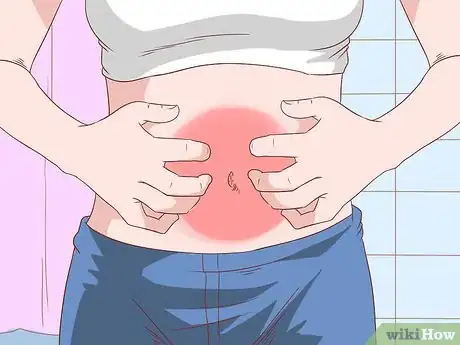
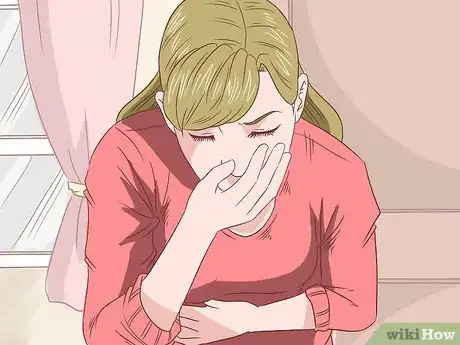
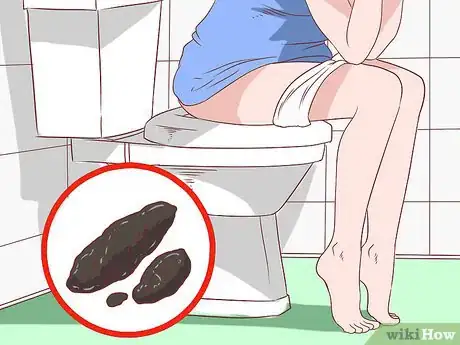
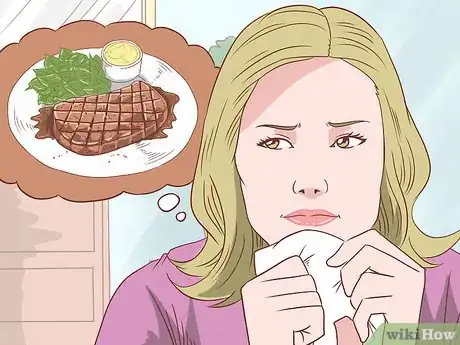
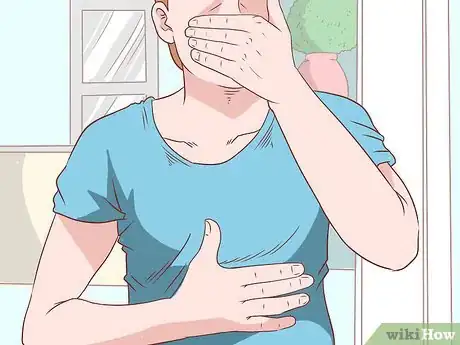
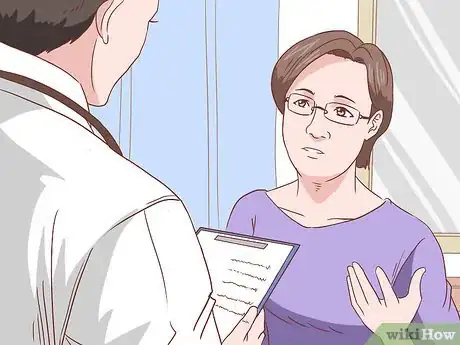
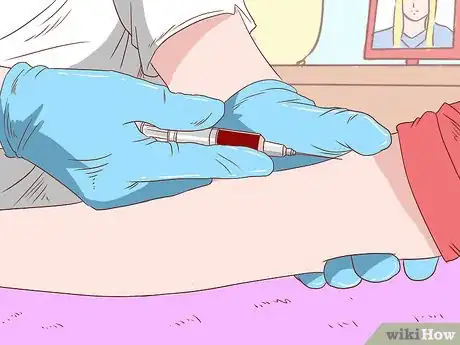
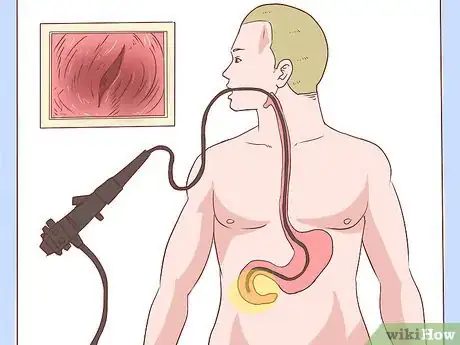
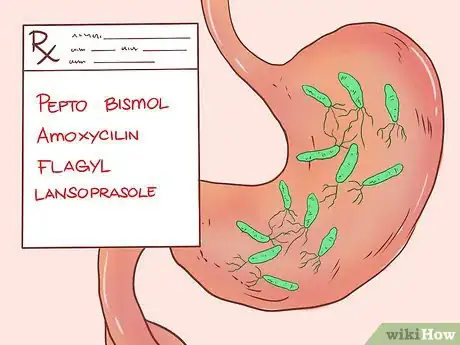
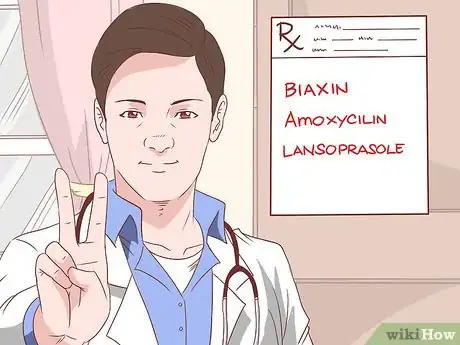
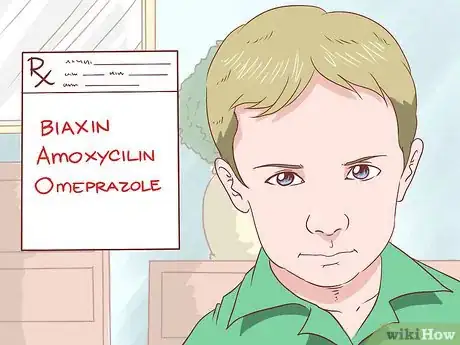

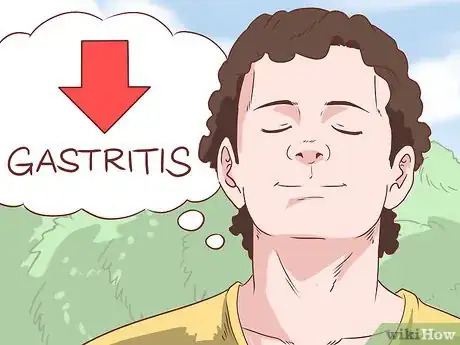
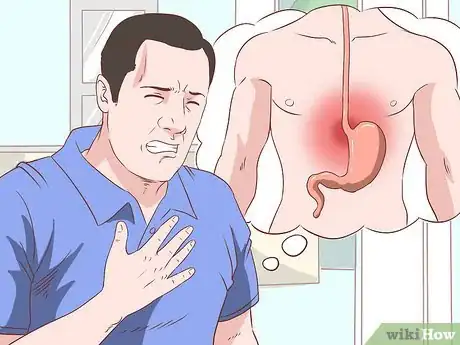
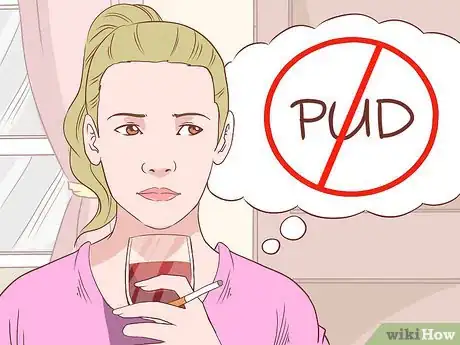
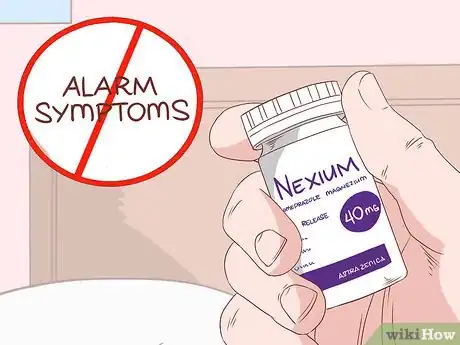
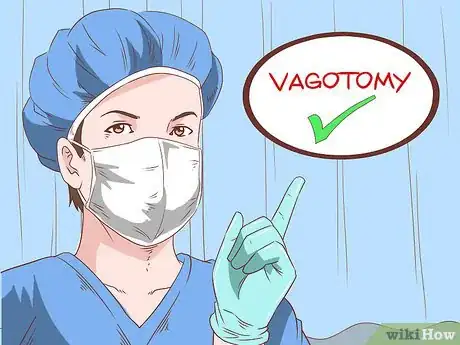
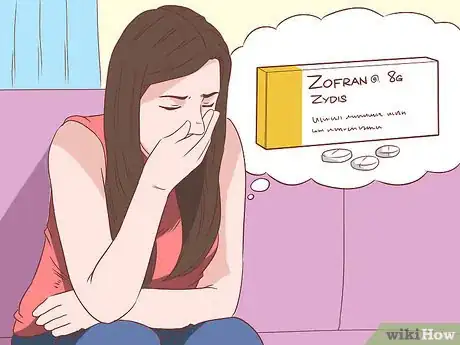
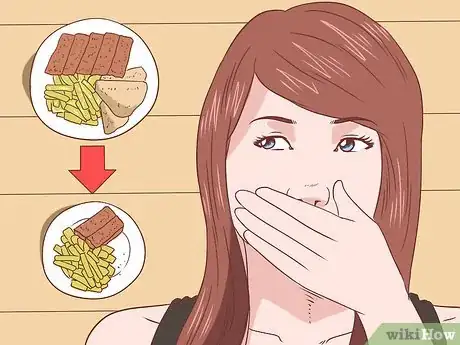

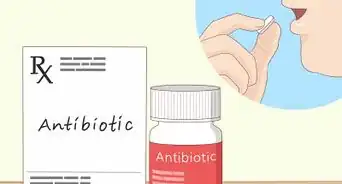


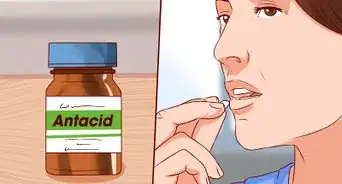
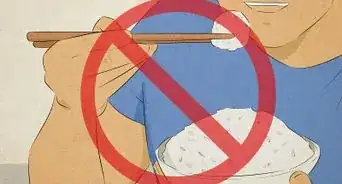

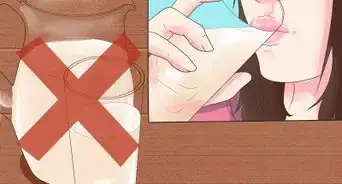
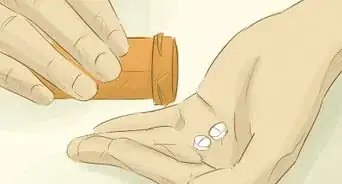
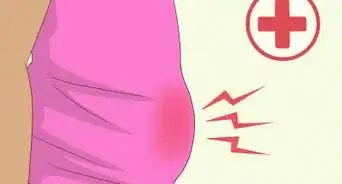














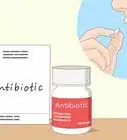





































Medical Disclaimer
The content of this article is not intended to be a substitute for professional medical advice, examination, diagnosis, or treatment. You should always contact your doctor or other qualified healthcare professional before starting, changing, or stopping any kind of health treatment.
Read More...